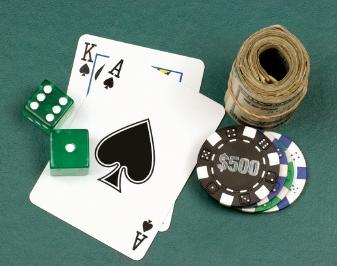|
 “He
who accounts all things easy will have many difficulties.” “He
who accounts all things easy will have many difficulties.”
-- Lao-Tse
In many ways, poker is a simple game. After all, kids play it. It doesn't take much to start with split kings in Stud and find
your way to the showdown no matter what. If there were no
rake, lots of mediocre players would hover around the
breakeven threshold, winning or losing a small amount mostly due to random luck.
Playing winning poker comes from making the most of advantages over an extended period of time -- a few big advantages, and a lot of
small advantages. Analyzing situations (even analyzing in a split second), exploiting opportunities, finding edges, all these things
help a player win. These things can be grouped under one heading: thinking.
Winning players think. Interestingly, the actual thought processes players use varies. Some are analytical. Others excel at perception --
reading a player, putting him on a hand, is a form of calculated thinking.
Of course, people are pretty dopey. We all make mistakes. One idea, commonly used in big bet poker, is to make your opponent think. If
you have either AK or 77, you want to be the one who reraises before the flop to get the guy with the other hand to fold, thus winning
the dead money in the pot without having to race to the river for a 50/50 showdown. Since we are all dummies, make your opponent
be the one to think. That is true enough, but beyond that, thinking correctly is what makes winners.
But most people are lazy. They don't want to think. They don't want to do the hard work of out-thinking and out-playing their opponents. They want shortcuts.
I see it all the time on the Internet -- people looking for quick answers to difficult problems. Some people read poker books or magazines
to be told "the answer." They want charts, rigid rules, systems, all kinds of things that give them answers. Some people do study
to really learn, but many just want to be told. If you don't understand the "why" of a situation, the "what" of what you do,
even if it is correct, is at best a road to mediocrity.
Using shortcuts, where somebody else has done the thinking for you, can often bring decent results, especially if that "somebody else"
is a top player. A parrot will be a big step up from the clueless players. However, parrots are many steps down from people who try to understand
the reasons for doing the right things. Learning to
play winning poker is about understanding the reasons, not the actual doing.
I love playing against parrots who use starting hand charts or point count systems. They aren't thinking about the game. They are
merely data-entry robots. They are no threat to me, and fortunately not a big threat to the bad players either.
Novices may do better in the short-run using charts and systems than just sitting down in a game as a pure virgin, but they
have no edge over the virgin in the long-run. Again, it's just like school. Having somebody tell you the answers is just not as good
as learning the answers yourself, even if it might be temporarily convenient.
Always having a formulaic, standard way to play to fall back on when you are confronted with a situation you can't figure out (or if
it is a coin flip decision) is fine. But you should approach any such rules as crutches. Crutches are not answers to problems. They
may be temporarily useful, but players should want to discard them.
The Lao-Tse quote at the beginning of this column brings up a further,
even more serious problem for players who rely on these crutches. Especially in Limit Texas Holdem, for which most chart-like things are designed,
the majority of the important decision-making takes place after
the flop. Post-flop play is where money is made (or lost). Unfortunately for them, chart-happy players find themselves in these pots/situations
without much of a clue as to why. Their chart said to three-bet with JJ, and now the flop comes Q97, and their opponent bets. What do
they do now? Reach for another chart? On the other hand, if you three-bet for a reason that you understand, the correct line of play
is usually pretty apparent. You raised because you know what you want to do when the flop comes Q97 and you are bet into.
If you don't know (or try to know) why you are doing what you do before the flop, how can you expect to know what to do afterwards?
Everything in a poker hand is interrelated. Think about what you are doing. Try to understand what you are doing. Don't let somebody
else think for you in the beginning of a hand, because they ain't gonna be around later in the hand to tell you what to do!
More articles focusing on Starting Hands and
Poker Hand Charts |

